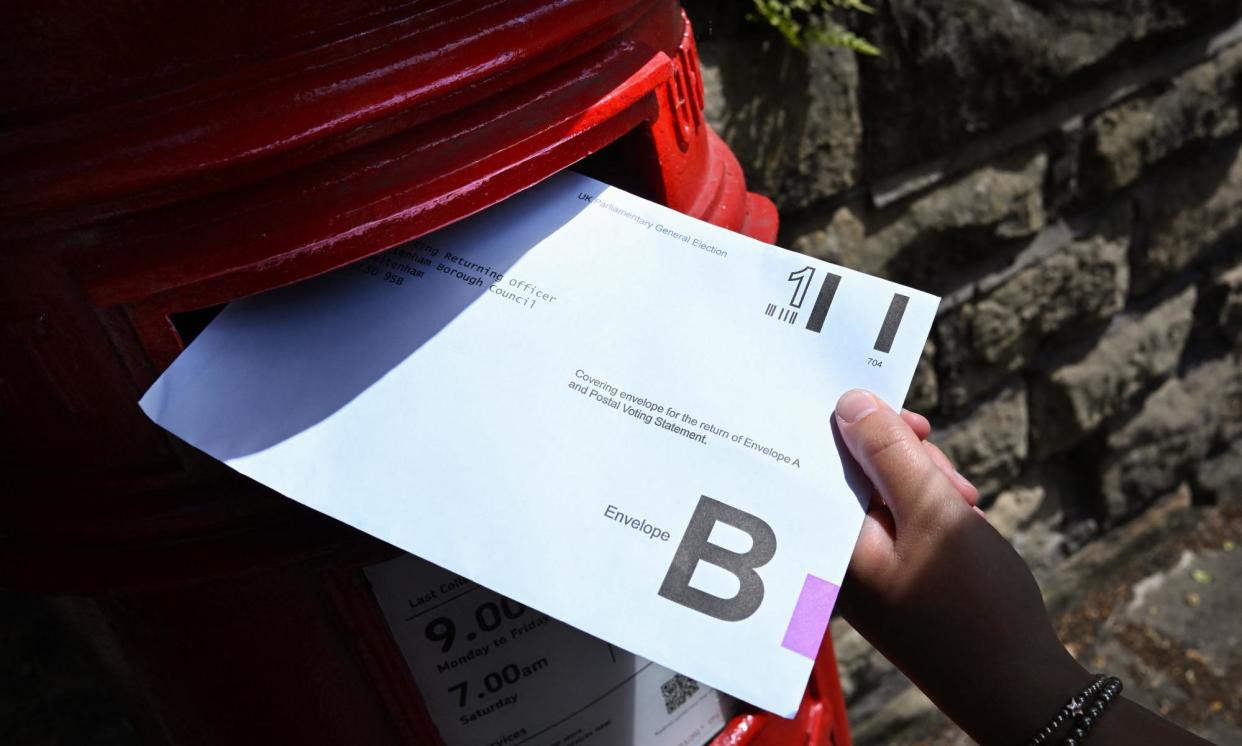Scottish election officials doing ‘all we can’ amid postal vote delays

Officials in Scotland have said they are doing “all we can” to ensure every voter can take part in the general election, amid delays in people receiving their postal votes.
The Scottish first minister, John Swinney, said he was worried some voters would be disfranchised by delays due to school holidays beginning in Scotland.
Two councils – City of Edinburgh council and Fife council – have set up emergency centres where residents who have yet to receive their ballot can have one reissued, or can even cast their vote before 4 July.
Speaking at an election rally in Glasgow on Saturday, Swinney said: “There are steps that can be taken by local authorities to make facilities available so people can vote. I very much welcome what the City of Edinburgh council did yesterday; other local authorities are considering that as well.
“I’ve asked the election management board to address the fact that some local authorities have done that but others have not done so. I’m inundated in my inbox. I suspect there’ll be effects on all political parties. But I think the crucial point is the disenfranchisement of individuals.”
Chris Highcock, the secretary of the Electoral Management Board for Scotland, said the number of postal voters had increased significantly in recent years.
He told BBC Radio 4’s Today programme: “I think the first thing we have to say is that the logistical timetable that we have to operate to for any UK election is already very tight. That’s been exacerbated in Scotland at this time, as many families have planned to be away on holiday.
“All materials are prepared in secure print facilities, they have to be then transported to the voter.
“The timetable is such that we’re only able to prepare ballot papers once we know who’s going to be on the ballot paper for UK elections.
“We’re doing all we can to ensure that every voter that’s entitled to vote in this election is able to take part – councils right across Scotland, and indeed the UK, are taking measures to make sure that, if any postal votes haven’t been received, voters can collect replacement ballot papers and make sure that they can have their say in this important election.
“We want to make sure that everyone can take part in an election if they’re entitled to vote, but also it’s very important that elections are secure, so that people can trust the results.
Related: UK voters: have you had any issues with your postal vote?
“There’s lots of integrity controls around elections. So therefore we’ve got to follow the law that applies for the election.”
He said materials were “produced under secure conditions” and staff had been working hard across the UK since the election was called.
Highcock, who is also returning officer for the City of Edinburgh council, added: “In Scotland, 20% of all voters are now postal voters – that has grown significantly in the last few years.
“In 2019 in Edinburgh, we had just over 72,000 postal voters, we’ve now got 103,000. That’s a 42% increase in that time.”
Glasgow city council said voters who applied for a postal vote after 5pm on 7 June but before 19 June could expect ballots to arrive on Saturday after “assurances by Royal Mail”, with 7,619 people in that category.
A statement said: “If a pack has not arrived by Monday, we will issue a replacement from our election office.”
A spokesperson for Glasgow city council said: “At any election, a small proportion of people experience problems with their postal vote. Where there has been an error or an issue with delivery, we are usually able to provide a replacement ballot.
“Of the nearly 80,000 postal votes in the city, we have been asked to issue 170 replacements.”
Other voters have complained of not receiving their postal votes in places as far apart as Cornwall and London.


